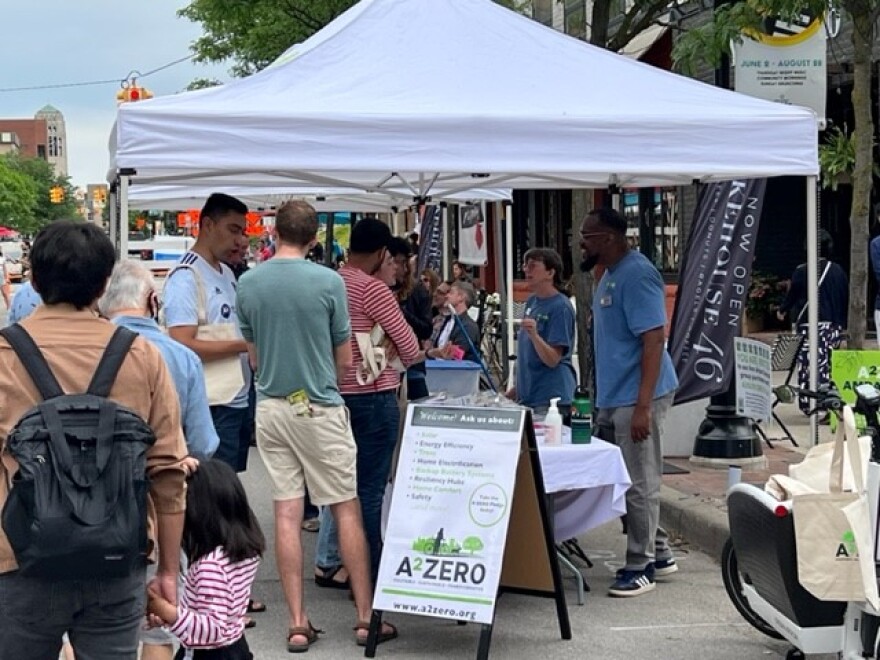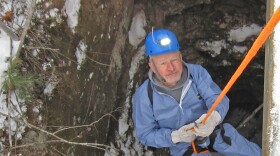Transcription
David Fair: This is 89 one WEMU, and welcome to a post-election edition of Issues of the Environment. I'm David Fair. And voters in Ann Arbor appear to have approved a 20-year one-mill tax to fund the city's response to the climate crisis. I say appear to have approved because there are some outstanding votes being tabulated. Final results expected in the next 15 to 20 minutes. But, right now, it looks as though 70% of Ann Arbor voters have said yes to this proposal one. It's called the Ann Arbor City Charter Amendment for Community Climate Action. And our guest this morning is going to celebrate not only that victory, but a personal one as well. Again, with a few votes to be counted, Mayor Christopher Taylor appears to have won by at least 10,000 votes to a third term in office. Thank you so much for taking time, and congratulations on both fronts.

Christopher Taylor: Well, thanks very much. It's an exciting day.
David Fair: In our conversations prior to the voting, you had expressed really extreme confidence in the ballot measure passing. Were you equally as confident you would win the mayor's race?
Christopher Taylor: Oh, you know, I always felt good. You know, I've knocked on thousands of doors and talked to thousands of voters. And I know that people appreciate and many people support the direction of the city. You know, we're working to improve basic services and enhance quality of life every day. And we're doing a good job. And I think voters recognize that.
David Fair: Well, not only does it appear that you've won reelection to a third term, but after the primaries and yesterday's vote, the makeup of city council was changing. And those chosen to serve by Ann Arbor voters appear to be more in line with your goals and aspirations for the city. What difference do you see that making in achieving the climate goals laid out in the A2Zero plan and funding and initiatives planned with passage of the Community Climate Action Measure?
Christopher Taylor: Well, with the passage of the Community Climate Action Millage, we have so much opportunity to do great things. We have the opportunity to to meet our A2Zero goal of communitywide carbon neutrality by the year 2030. And we're going to get there. There'll be direct rebates for home and rental and businesses for electric energy improvements. There'll be energy waste reduction, renewable energy installations, appliance electrification, storage, composting expansion, and recycling, particularly with commercial and multi-family units, renewable energy deployments at affordable housing sites, and so much more. And with the new council, I think you're going to see a group of people who are excited to affect real and meaningful and positive change in the city--change that improves the lives of residents today but also prepares our community for tomorrow. It's a group of people who are not there to fight, who are not there to peddle grievance and misinformation. It's a group of people who are there to...you know, we're going to disagree. And that's just great. But we're going to do so like reasonable people, and we're going to always be looking forward for the residents.
David Fair: One of the great things about a community that invests in things like the Community Climate Action Plan is that it gives the municipal leaders the opportunity to leverage that into further investment. So, my guess is you've also been watching the legislative races at both the state and federal levels. Based on what we know at this hour, how do you feel about outcomes?
Christopher Taylor: Well, I'm particularly excited about--well, I'm excited about opportunities both at the state and federal level. It's a whole new day, it seems, in Lansing. And we're going to have to, you know, recalibrate for a legislature that is looking forward, for a legislature that understands that we have to make investments in our community and our people and our infrastructure in our climate, if we're going to have the the present, frankly, but also, most importantly, the future that we're all looking for. We're going to now have a legislature that understands that's going to respond to it. And we just can't wait to get started.
David Fair: WEMU's Issues of the Environment continues with the newly reelected mayor of Ann Arbor, Christopher Taylor. The first year of the Community Climate Action Tax is going to be levied in 2023, and it's expected to raise in the neighborhood of $6.8 million. What comes very first with that money?
Christopher Taylor: Well, we're going to put $1,000,000 of that money to two solar installations. We're going to improve recycling and composting. We're going to affect direct energy improvement grants for home rental and businesses. We're going to work to support neighborhood resilience centers for heat and flood preparedness. There will be, of course, you know, our pedestrian and non-motorized transportation infrastructure, which is a really important part of our A2Zero plan. And so, they'll be more street lights, protected crosswalks, and bike lanes. And you'll also see electric vehicle infrastructure improving and expanding throughout the community. This is an opportunity for us to take real action, and I know that the city council and the staff just can't wait to get it done.
David Fair: As mentioned, the A2Zero plan and the city have a goal of carbon neutrality by the year 2030. That's just a little over seven years away, and there's still a long way to go to get there. While there have been tangible improvements in that direction over the last few years, how is this infusion of money going to accelerate the process?
Christopher Taylor: It's going to enable us to work on structural changes. It's going to enable us to work on improving energy creation in Ann Arbor--energy storage in Ann Arbor. We're going to be able to, you know, we have a capped landfill where we want to build a 20-plus megawatt solar array. That's just the beginning. We have rooftop solar, which is something where we've had incredible success with--our solarized program. We'll be able to expand that even further. We need to make and affect real structural change. We're going to be in a position to do that both directly and, of course, you know, we'll be able to take advantage of foundation grants and state and federal grants in a way where we previously would be hampered by the absence of local match funding. Now that local match funding is there, we can be creative with some of the leading experts in climate action and climate response throughout the country. And we are, you know, we're giddy. We're looking forward to it.
David Fair: That is a lot of investment in a relatively small community. Do you anticipate job creation and economic improvement in this city as a result of passage of this measure?
Christopher Taylor: Well, there's no question that there will be job creation and economic improvement. This is not about dislocation. This is about being additive. You know, we are going to be looking to electrify our homes, electrify our community, our businesses. There will need to be improvements to the built infrastructure throughout the city. They'll need to be new and more improved and more efficient, new infrastructure, new buildings throughout the city. Energy efficiency programs. You know, the green economy is great for the environment, great for carbon neutrality, but it's also pro-jobs. And, you know, I can't say enough about it.
David Fair: Once again, we are talking with Ann Arbor Mayor Christopher Taylor. He has won a reelection to a third term in the midterm elections. He's also celebrating passage of the city's Community Climate Action ballot proposal. And that's the focus of this week's edition of Issues of the Environment. You may have touched on it, but I want to go more directly. Conversations have been underway, and studies exploring the possibility of creation of a municipal utility and taking full control of the city's energy future. Where does that stand at the moment?
Christopher Taylor: Well, that continues to be explored. We have a feasibility study to explore a traditional energy utility, which would require the seizure of subsequent maintenance of DTE's existing electric distribution infrastructure. We also have, in that feasibility plan, an exploration of a sustainable energy utility, which is essentially be a series of nano and microgrids spread throughout the city, whereby we create clean, renewable electricity locally, store it, and utilize it both in homes and businesses. The process to obtain a traditional energy utility hasn't been done in, you know, something like 90 years in Michigan. We need to explore it, because it is, of course, an option. We need to understand the cost of the process. It would require, in my estimation, at least years of litigation with DTE--on certain litigation--in order to determine the price at which we would have to buy their existing infrastructure throughout the city. But it's important that we have a feasibility study and perhaps if it continues to appear feasible, subsequent feasibility studies, because it's an option. And we have to explore it.
David Fair: You mentioned that it might turn into a long, drawn-out court process with DTE energy. Has there been any preliminary conversations to kind of get a feel of where they are and is where they are? We're going to court?
Christopher Taylor: Well, there have not. You know, the city council has not directed staff to pursue that. We are looking into the feasibility of the project. This first feasibility study will, like I said, look at the sustainable energy utility as the ultimate measure. And we'll also look at a traditional energy utility, whereby we seize DTE's existing assets. The feasibility study will give us some directionality. And if we continue to move forward and another feasibility study gets us a little more particularity, a little more clarity, on what we believe the price of DTE's assets to be, then, at that point, the council could make a decision to go forward and seek engagement with DTE. At this point, there has been no engagement. I think it wouldn't be hard to guess that they would not be in favor of a seizure of their assets, even for a price established in the course of litigation. But, you know, who can possibly say?
David Fair: Well, that's a conversation for another day, perhaps another year. But thank you so much for the time today, Mr. Mayor. I appreciate it.
Christopher Taylor: It's always a pleasure. Thanks for calling.
David Fair: That is Ann Arbor Mayor Christopher Taylor, who has won reelection and will serve a third term in office and is celebrating today the passage of the city's Community Climate Action proposal. It will levy a one-mill tax over the next 20 years to help fund the city's goal of carbon neutrality and becoming a more sustainable city. Issues of the Environment is produced in partnership with the Office of the Washtenaw County Water Resources Commissioner. We bring it to you every Wednesday. I'm David Fair, and this is your community NPR station, 89 one WEMU FM Ypsilanti.
Non-commercial, fact based reporting is made possible by your financial support. Make your donation to WEMU today to keep your community NPR station thriving.
Like 89.1 WEMU on Facebook and follow us on Twitter
Contact WEMU News at 734.487.3363 or email us at studio@wemu.org







